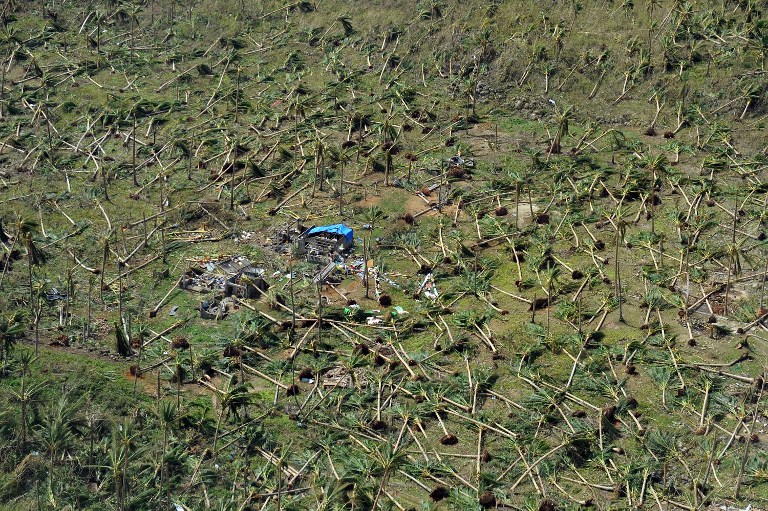
This aerial photo shows uprooted coconut trees on a hill near the town of Guiuan in Eastern Samar province in the central Philippines on November 11, 2013 only days after Super Typhoon Haiyan devastated the town on November 8. FILE PHOTO
Economic losses brought on by Supertyphoon Yolanda have gone up further to P10.59 billion, according to the Department of Agriculture.
Agriculture Undersecretary Dante S. Delima said in an interview that, after two weeks of preliminary assessment, production losses are now estimated at P8.6 billion, while damage to infrastructure has been pegged at P1.98 billion.
Asked whether the figure could still rise in the coming days, Delima said “no.”
“We are holding regional consultations next week to validate the numbers,” Delima said. “It is even possible that the figure could go down.”
He said that, based on experience, preliminary data on agricultural damage resulting from natural calamities could be trimmed by as much as 25 percent.
“In some cases, initial assessment done by field units could turn out to be … wrong,” he explained.
Yolanda affected 77,719 hectares of rice land, claiming 147,357 metric tons (MT) of palay worth P2.38 billion.
Damage to livestock came close with P2.32 billion, mostly in terms of draft animals.
The entire Eastern Visayas chalked up P765.28 million worth of carabaos, aside from P574.1 million worth of hogs, that perished during Yolanda’s onslaught.
In Cebu alone, a major poultry producing area, P468.25 million worth of chickens and eggs had been reported lost.
Coconut farms incurred losses totaling P1.52 billion. The province of Leyte alone represented P960.48 million covering 41,662 hectares of farms.
Damage to fisheries was recorded at P1.49 billion, mostly in the Western Visayas.
But while Yolanda appeared to have posted a record amount in terms of total damage to agriculture, Delima downplayed the supertyphoon’s effect on the rice sector.
“The affected areas are not strategic production areas,” said Delima, who heads the National Rice Program. “I remember two years ago when a series of typhoons wiped out a million metric tons of palay.”
According to the DA, Eastern Visayas accounted for the biggest production loss in rice valued at P1.82 billion.
Delima also denied reports attributed to the Food and Agriculture Organization of the United Nations, which alleged that Yolanda destroyed a third of the country’s rice producing areas.
“I chanced upon FAO representatives today and they told me [the organization] was misquoted,” he said.

